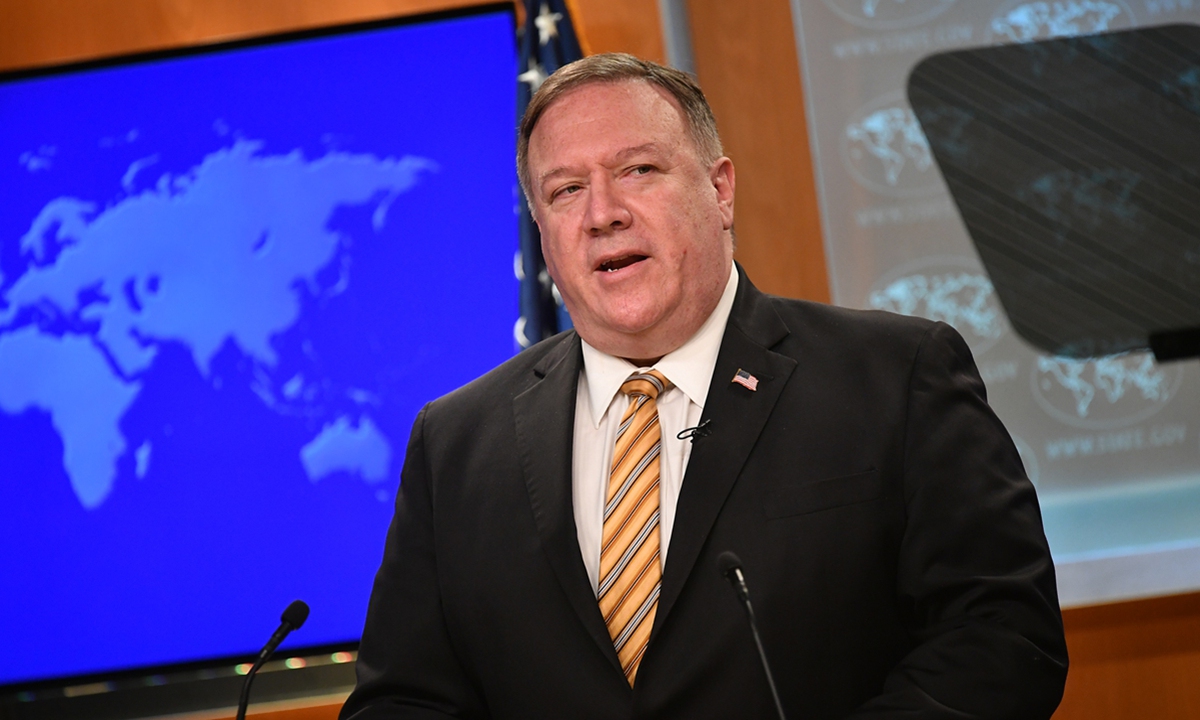Pompeo’s new cold war declaration hardly appealing to US allies
By Sun Chenghao Source: Global Times Published: 2020/7/26 20:59:53

US Secretary of State Mike Pompeo File photo: AFP
US Secretary of State Mike Pompeo on Thursday delivered an address on China in which he called to discontinue "blind engagement" with China. He said the free world must change China, or "China will surely change us."
Washington's repeated hardline stance against Beijing derives from the Trump administration's tactic of diverting public attention from domestic issues in an attempt to boost his reelection chances. The US' tough position on China also embodies its long-term strategy of China.
The most urgent goal of the Trump administration is to reverse its current unfavorable position in the reelection campaign due to the mishandling of the pandemic response. The spread of COVID-19 has led to a US economic downturn. US President Donald Trump's overall approval ratings are declining. His administration has not found an effective way to curb the pandemic. Against this backdrop, the Trump administration is playing the China card to distract the dissatisfaction the public feels over fighting the virus.
Although not everyone in the US strategic circle believes the US should launch a so-called new cold war against China, they are on the same page when it comes to seeking changes in the US' China policy. In this context, anti-China forces, such as Pompeo, look to pursue a tougher approach to contain China.
However, US hawks on China will not completely overturn the foundation of China-US relations laid out by former President Richard Nixon. US hawks can shift US policy toward China from engagement to confrontation. But bilateral relations involve various layers such as economic exchanges, people-to-people exchanges and top-level contacts. These cannot all be put to an end.
Washington may take some tougher measures to decouple with Beijing in some fields, such as high-tech, particularly 5G. In terms of science and technology, it is evident that China has recently been catching up. The US sees it as a challenge to its technological lead.
The US will put more limitations on people-to-people exchanges with China. This is because the US believes China is taking advantage of the US' "open" educational and social systems for China's own good.
Regarding the economy, whoever takes office will pursue more reciprocity on trade. Decoupling in industrial sectors to some extent may be witnessed.
Many media outlets have labeled Pompeo's speech as a declaration of a new cold war against China.
The US will woo its allies to contain China by piling more pressure on them in the economy and security domains.
The US will also continue to emphasize democratic values with its allies, claiming that democratic countries should join in the US' camp in fighting against so-called Chinese tyranny.
However, it is unrealistic to form two confrontational military camps today like that during the Cold War, as the international situation has undergone great changes. During the Cold War, the US and the Soviet Union were basically isolated from each other in economy and trade. But the economies and trade of China and US are deeply intertwined.
Over the years, considerable progress in collaboration between China and European countries, close allies of the US, have been made. Central and Eastern European countries have participated in the China-proposed Belt and Road Initiative.
Given the current in-depth interactions between China and US' allies, an abrupt demand to decouple from Beijing and siding absolutely with Washington would be unrealistic for those countries as it would damage the interests of those allies or partners.
That being said, tensions between China and the US will escalate, since Pompeo has advocated an end to "blind engagement" with China. Yet a new cold war is unlikely, and the worst-case scenario is more likely in certain regional areas, such as the South China Sea.
The US' overall policy toward China will not change any time soon, even if Democratic candidate Joe Biden assumes power after the November election. Competition will still be the main theme in China-US ties. Yet Biden will adopt different approaches while being a bit more rational.
Biden might resume people-to-people exchanges and high-level dialogues with China. He would wish to communicate with Beijing. Moreover, the Democratic Party attaches importance to global governance and Biden has already announced he would reverse Trump's move to withdraw from the WHO "on day one" if he wins the election.
At that time, China and the US will have more room for cooperation.
The author is an assistant research professor at the Institute of American Studies, China Institutes of Contemporary International Relations. opinion@globaltimes.com.cn
Posted in: VIEWPOINT